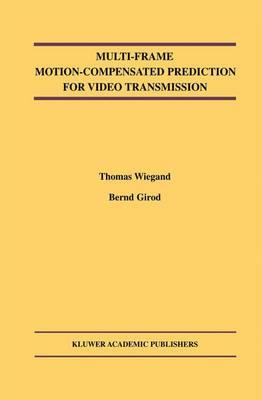Overview
This volume presents a comprehensive description of a technique in video coding and transmission. The work presented in the book has had a very strong impact on video coding standards and should be of interest to practicing engineers and researchers as well as academics. The multi-frame technique and the Lagrangian coder control have been adopted by the ITU-T as an integral part of the well known H.263 standard and are were adopted in the ongoing H.26L project of the ITU-T Video Coding Experts Group.
Full Product Details
Author: Thomas Wiegand ,
Bernd Girod
Publisher: Springer
Imprint: Springer
Edition: 2001 ed.
Volume: 636
Dimensions:
Width: 15.50cm
, Height: 1.10cm
, Length: 23.50cm
Weight: 0.960kg
ISBN: 9780792374978
ISBN 10: 0792374975
Pages: 150
Publication Date: 30 September 2001
Audience:
College/higher education
,
Professional and scholarly
,
Undergraduate
,
Postgraduate, Research & Scholarly
Format: Hardback
Publisher's Status: Active
Availability: In Print

This item will be ordered in for you from one of our suppliers. Upon receipt, we will promptly dispatch it out to you. For in store availability, please contact us.
Reviews
'This body of work by Thomas Wiegand and Bernd Girod has already proved to have an exceptional degree of influence in the video technology community ... As the community has grown to appreciate the long-term memory feature, it has become an embraced part of the conventional wisdom. When the ITU-T launched an initial design for a next-generation 'H.26L' video coding algorithm beyond the capabilities of today's standards, Wiegand's long-term memory idea was in it from the very beginning. The tide has turned. What once seemed like the strange and wasteful idea of requiring storage and searching of extra old pictures is becoming the accepted practice - indeed it is the previous practice of throwing away the old decoded pictures that has started to seem wasteful.' From the foreword by Gary J. Sullivan (ITU-T/SG16 & MPEG Video Chairman)
This body of work by Thomas Wiegand and Bernd Girod has already proved to have an exceptional degree of influence in the video technology community ... As the community has grown to appreciate the long-term memory feature, it has become an embraced part of the conventional wisdom. When the ITU-T launched an initial design for a next-generation H.26L' video coding algorithm beyond the capabilities of today's standards, Wiegand's long-term memory idea was in it from the very beginning. The tide has turned. What once seemed like the strange and wasteful idea of requiring storage and searching of extra old pictures is becoming the accepted practice - indeed it is the previous practice of throwing away the old decoded pictures that has started to seem wasteful.' From the foreword by Gary J. Sullivan (ITU-T/SG16 & MPEG Video Chairman)




